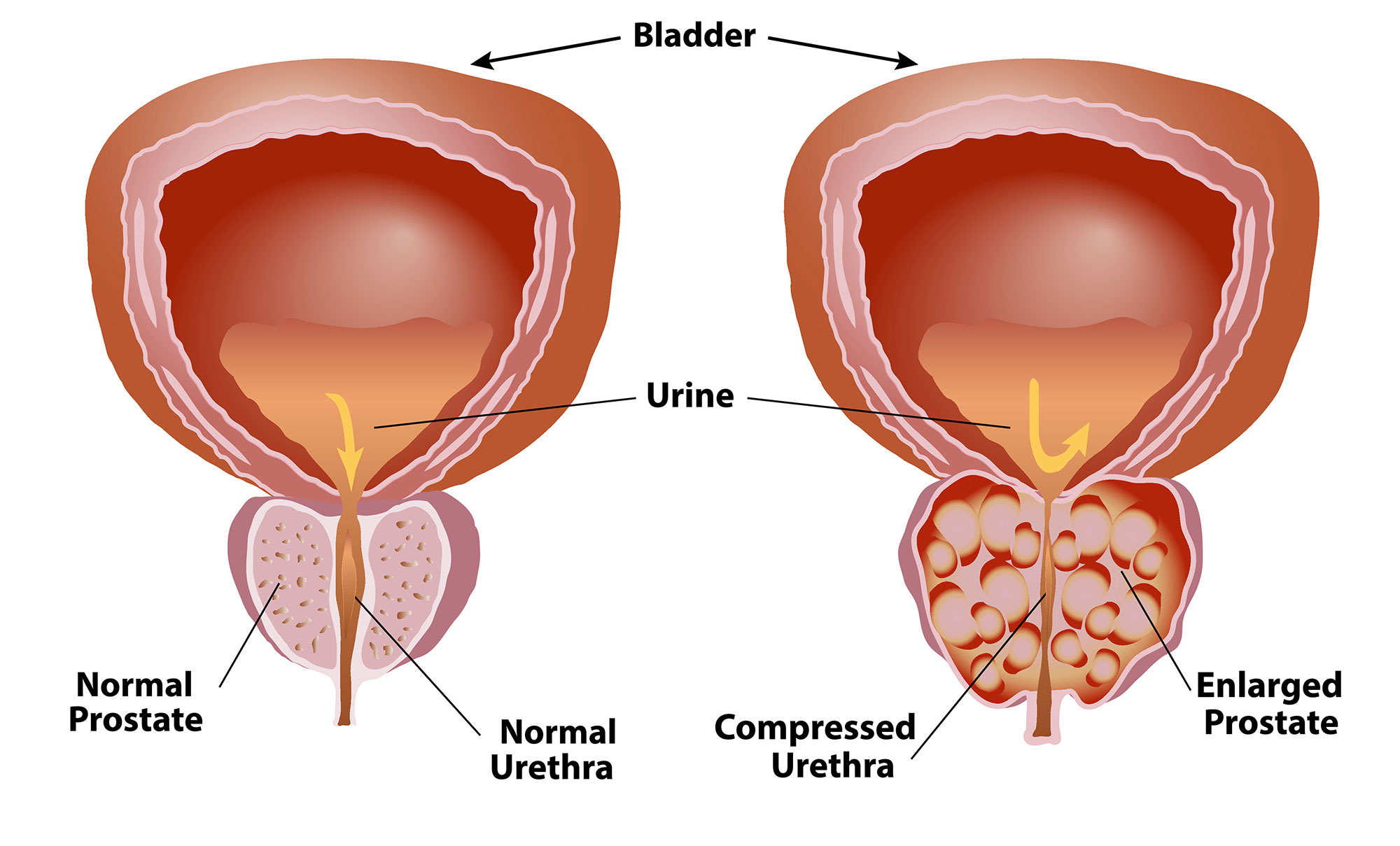It is very common for the prostate gland to grow bigger as men age. This condition is called Benign Prostatic Hyperplasia (BPH) or prostatic gland enlargement. As the prostate gland enlarges, it presses against the urethra. The pressure causes the urethra to narrow and the bladder to work harder to eliminate urine through it. The bladder may contract even when it contains only a small amount of urine. Eventually, the bladder wall weakens and is unable to completely empty the urine. BPH usually does not cause symptoms before the age of 40, but many men experience BPH after their sixties.
Signs and symptoms:
When the prostate enlarges, it may constrict the flow of urine. Nerves within the prostate and bladder may also play a role in causing the following common symptoms:
- Urinary frequency.
- Urinary urgency.
- Hesitancy: Difficulty initiating the urinary stream; interrupted, weak stream.
- Incomplete bladder emptying: The feeling of persistent residual urine, regardless of the frequency of urination.
- Straining: The need strain or push (Valsalva maneuver) to initiate and maintain urination in order to more fully evacuate the bladder.
- Decreased force of stream: The subjective loss of force of the urinary stream over time.
- Dribbling: The loss of small amounts of urine due to a poor urinary stream.
When to see a doctor?
If you're having urinary problems, discuss them with your doctor. Even if you don't find urinary symptoms bothersome, it's important to identify or rule out any underlying causes. Untreated, urinary problems might lead to obstruction of the urinary tract. If you're unable to pass any urine, seek immediate medical attention.
پروسٹیٹ کے غدود کا بڑھنا (Benign Prostatic Hyperplasia- BPH)
پروسٹیٹ کا غدود کا مردوں کی عمر کے ساتھ بڑا ہونا بہت عام ہے۔ اس حالت کو Benign Prostatic Hyperplasia (BPH) یا prostatic gland enlargement کہا جاتا ہے۔ جیسے جیسے پروسٹیٹ کا غدود بڑا ہوتا ہے ، یہ پیشاب کی نالی میں دباؤ پیدا کرتا ہے۔ دباؤ کی وجہ سے پیشاب کی نالی میں رکاوٹ پیدا ہوتی ہے اور مثانہ کو اس نالی کے ذریعے پیشاب کو خارج کرنے کے لیے سخت محنت کرنی پڑتی ہے۔ مثانہ اس وقت بھی سکڑ سکتا ہے جب اس میں صرف تھوڑی مقدار میں بھی پیشاب ہو۔ بالآخر ، مثانے کی دیوار کمزور ہوجاتی ہے اور پیشاب کو مکمل طور پر خارج کرنے سے قاصر ہوتی ہے۔ BPH عام طور پر 40 سال کی عمر سے پہلے علامات ظاہر نہیں کرتا اور بہت سے مردوں کو ساٹھ کی دہائی میں جا کر علامات ظاہر ہونی شروع ہوتی ہیں۔
نشانات و علامات
جب پروسٹیٹ بڑھ جاتا ہے تو یہ پیشاب کے بہاؤ کو کم کر سکتا ہے۔ پروسٹیٹ اور مثانے کے اندر مندرجہ ذیل عام علامات پیدا کرنے میں بھی کردار ادا کر سکتے ہیں۔
- پیشاب زیادہ مرتبہ آنا۔
- پیشاب خارج کرنے کی فوری ضرورت محسوس ہونا۔
- پیشاب کا بہاؤ شروع کرنے میں دشواری، کمزور بہاؤ
۔ مثانے کا مکمل خالی نہ ہونا: پیشاب زیادہ آنے کو باوجود مسلسل پیشاب باقی رہ جانے کا احساس۔
- کشیدگی: مثانے کو مکمل طور پر خالی کرنے کے لیے پیشاب شروع کرنے اور برقرار رکھنے کے لیے تناؤ یا زیادہ زور لگانے کی ضرورت پیش آنا۔ - پیشاب کے بہاؤ کی قوت میں کمی۔ - ڈریبلنگ: پیشاب کے بہاؤ میں رکاوٹ کی وجہ سے تھوڑی مقدار میں پیشاب بہتے رہنا۔
ڈاکٹر سے کب ملنا ہے۔
اگر آپ کو پیشاب کرنے میں دشواری ہو رہی ہے تو اپنے ڈاکٹر سے اس کے بارے میں بات کریں۔ اگر آپ کو پیشاب کی علامات پریشان کن نہیں بھی لگتی ہیں ، پھر بھی کسی بھی بنیادی وجوہات کی نشاندہی ہونا یا ان کو مسترد کرنا ضروری ہے۔ علاج نہ کیا گیا تو یہ مسائل پیشاب کی نالی میں رکاوٹ کا باعث بن سکتے ہیں۔ اگر آپ پیشاب بالکل رک گیا ہو تو فوری طبی امداد حاصل کریں۔
Doctors to consult (Urologist):
Asst.Prof. Dr. Mohsin Naveed, Dr. Nina Munir, Dr Shahid Hussain, Dr. Zafar Abbas
Note: Click the Doctor's name to make an appointment.
Reference:
https://www.rockvilleconciergedocs.com/PatientEducation/tabid/40343/ctl/View/mid/86303/Default?ContentPubID=57
https://www.mayoclinic.org/diseases-conditions/benign-prostatic-hyperplasia/symptoms-causes/syc-20370087

